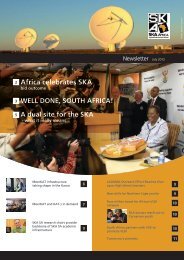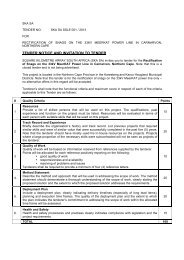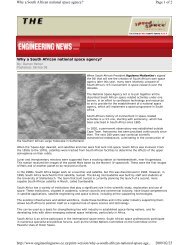S K A N E W S M A R C H 2 0 1 3FUN AND GAMES(AND LEARNING AND NETWORKING)AT THE ANNUAL STUDENT CONFERENCEA friendly game of cricket, a tradition started by the late Prof Steve Rawlings, markedthe end of yet another successful South African <strong>SKA</strong> Postgraduate Bursary Conference.Teams for the 2012 matchwere drawn from the ElectromagneticsResearchGroup at Stellenbosch Universityand the MeerKATproject team based in CapeTown. Lunch time discussionson team choices andstrategy provided somelight-hearted diversionsin-between the 13 conferencesessions.The 2012 event was theseventh <strong>SKA</strong> SA bursaryconference, and the attendancelist included nearly200 delegates. The conferencehas become a highlightfor local andinternational radio astronomersand engineersworking on the MeerKATand <strong>SKA</strong>. As in previousyears, the 2012 conferencebrought together <strong>SKA</strong> SAfunded postgraduate studentsand postdoctoralfellows, as well as selected<strong>SKA</strong> SA funded undergraduatestudents. Supervisors,the <strong>SKA</strong> SA ResearchChairs, other interestedresearchers, and invitedspeakers from universitiesin Europe and America alsoattended.More than 90 postgraduatestudents, and postdoctoralfellows, presented thestatus of their research.The topics covered galaxyformation and evolution,cosmology, radio astronomytechniques and technologies,and the antennasystems for MeerKAT andthe <strong>SKA</strong>. The quality of theresearch and the level ofpresentations again impressedboth the local andinternational participants.Dr Jaap Baars from theMax Planck Institute forRadio Astronomy, and apioneer in radio astronomytechniques, presided overthe conference prize-givingceremony. He said that thesheer size of the studentpool present made SouthAfrica the envy of the internationalscientific community.“Your investment inpeople in this way is creatinga basis in science andtechnology that will ensurethe proper design, constructionand use ofMeerKAT, and the <strong>SKA</strong>,”believes Dr Baars, who wasone of the ten invited internationalspeakers at theconference.The following awards werereceived:Overall best presentations:• Best overall presentationby a PhD student: AndreYoung (StellenboschUniversity)Improving beam patternestimation for futureradio telescopes• Best overall presentationby a Masters student:Marisa Geyer (StellenboschUniversity)Ordering chaos aroundbumpy black holes using<strong>SKA</strong>Engineering:• Best poster by an MScstudent: Shaun Katz(University of Cape Town)Rhino modelling environment• Best presentation by anMSc student: Mark Volkmann(StellenboschUniversity)The use of superconductorsin the <strong>SKA</strong>• Best poster by a PhDstudent: Joely Andriambeloson(StellenboschUniversity)Time domain studies inreverberation chambers• Best presentation by aPhD student: BrendonPotgieter (StellenboschUniversity)Probabilistic model updatingfor the validationof antenna modelsAstronomy:• Best poster by an MScstudent: MohammedEmritte (University ofJohannesburg)Constraints on thenon-thermal pressure ingalaxy clusters fromradio halo and SZ effectdata• Best presentation by anMSc student: NikhitaMadhanpall (University ofthe Western Cape)Towards cosmic magnificationwith the new radiosurvey• Best poster by a PhDstudent: Alida Odendaal(University of the FreeState)CAL 83 - A supersoftX-ray source in the LMC• Best presentation by aPhD student: TomMutubazi (University ofCape Town)Distance measurementsand peculiar velocity ofthe Norma clusterThe annual <strong>SKA</strong> Africa Postgraduate Bursary Conference also provides achance for old acquaintances from across the world to meet up again, forvaluable networking and for collaborations to be strengthened. Dr MarioSantos, of the Technical University of Lisbon, and Dr Caroline Zunckel(pictured) of the University of KwaZulu-Natal are both Oxford Universitygraduates who shared the same PhD study leader. Dr Santos, an invitedspeaker at the conference, focused on the prospects of studying cosmologywith the help of the next generation of radio telescopes.
S K A N E W S M A R C H 2 0 1 3This year’s conference includedthe inaugural SteveRawlings memorial lecture.This lecture, honouringour late colleague andfriend, will be part of allfuture conferences. ProfMatt Jarvis of Oxford Universityand the University ofthe Western Cape, a closefriend and colleague ofSteve’s, presented the firstlecture. Steve was a greatsupporter of the SouthAfrican <strong>SKA</strong> effort, a brilliantresearcher and a kindand genuine friend, and hewill be greatly missed.REFLECTING ON SOUTHAFRICA’S SUCCESSFUL <strong>SKA</strong> BID“Teamwork and a keen sense of detail helped SouthAfrica and its partner counties to be chosen as thepreferred <strong>SKA</strong> site” said <strong>SKA</strong> SA Site Bid Manager,Dr Adrian Tiplady, in his overview of the decadelongbid campaign.“The arrival of the <strong>SKA</strong> in Africa is the outcome ofmany years of dedicated effort by various people,”he stressed in his presentation at the conference,which was packed with anecdotes and vintagephotographs. “In 2002 our aspiration wasn’t necessarilycommensurable to the budget,” he noted ofthe initial R2,5 million budget and R1,9 million forRadio Frequency Interference (RFI) monitoringequipment. This, however, did not stop South Africato submit its “Initial Offer to Host the <strong>SKA</strong>” in May2003, under leadership of Dr Bernie Fanaroff. Bythen “Site K3” in the Karoo had been selected as thecore telescope site, ahead of options in the Kalaharior Namaqualand.Dr Bernie Fanaroff, <strong>SKA</strong> SA Project Director (front middle) and Dr JaapBaars (front right), Max Planck Institute for Radio Astronomy in Germany,with the winners at the prize-giving ceremony. They are (front row, from left)Marisa Geyer (Stellenbosch University), Nikhita Madhanpall (University ofthe Western Cape) and Mohammed Emritte (University of Johannesburg).At the back are (from left) Mark Volkmann (Stellenbosch University), TomMutubazi (University of Cape Town), Joely Andriambeloson (StellenboschUniversity), Alida Odendaal (University of the Free State) and Andre Young(Stellenbosch University). (Photo: Engela Duvenage)South Africa’s further Response to the Request forProposals to Host the <strong>SKA</strong> followed in December2005, and elaborated on aspects such as the qualityof science, siting issues, infrastructure, climate andcost. Dr Tiplady believes the initial radio frequencymonitoring campaign, spanning twelve months and40 sites, ensured that South Africa was shortlisted.The final 150-page bid summary, and the elevenreports, on aspects such as the RFI environment,array science performance, power provision,tropospheric turbulence, infrastructure cost andlabour issues, (consisting of 27 000 pages in total!),were submitted a mere twelve weeks after the <strong>SKA</strong>Siting Group issued their Request for Information inJune 2011.








